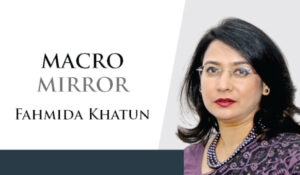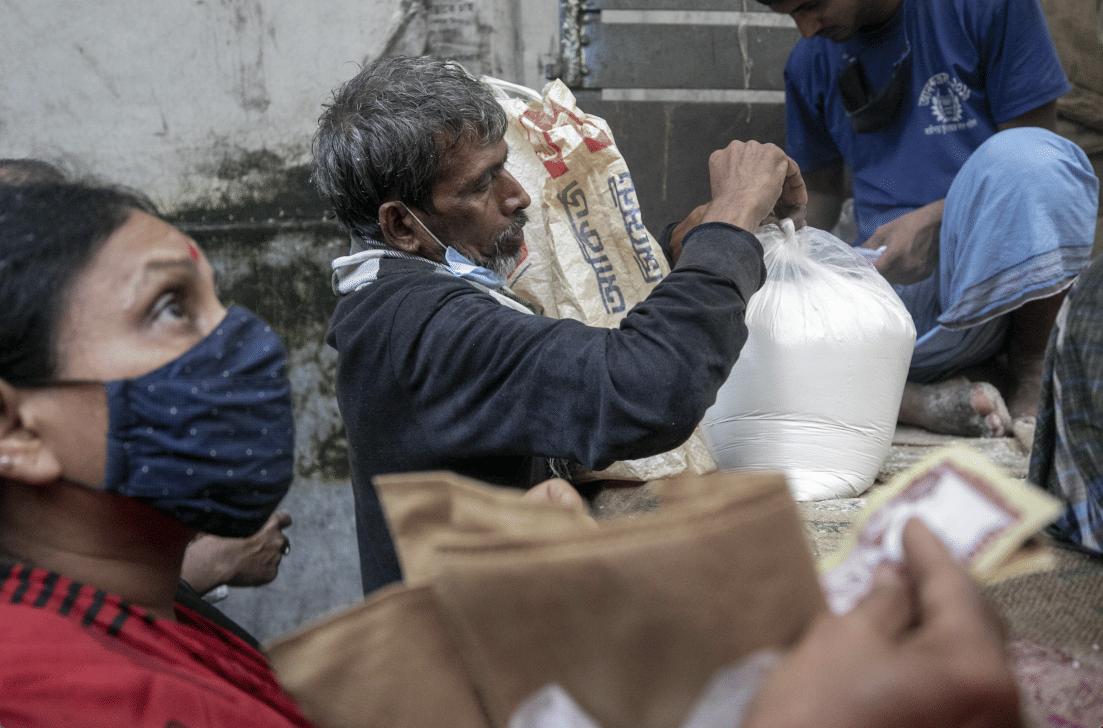Originally posted in The Daily Star on 25 September 2023
 We have been battling – and failing to contain – high inflation for a while now. We saw the fiscal year 2022-2023 end with high inflation, with the monthly average inflation being 9.02 percent in June. In FY 2023-2024, there is still no sign of the inflation rate declining. Rather, in August, general point-to-point inflation was at 9.92 percent, with food inflation being 12.54 percent – the highest in the last 12 years in Bangladesh.
We have been battling – and failing to contain – high inflation for a while now. We saw the fiscal year 2022-2023 end with high inflation, with the monthly average inflation being 9.02 percent in June. In FY 2023-2024, there is still no sign of the inflation rate declining. Rather, in August, general point-to-point inflation was at 9.92 percent, with food inflation being 12.54 percent – the highest in the last 12 years in Bangladesh.
During this time, several countries (even ones in the subcontinent) have managed to rein in their inflation. Sri Lanka is a case in point and has been much discussed for its success in putting its economy onto a positive trend over about one-and a-half years. The island country managed to bring its inflation rate down to four percent in August 2023, from as high as 73 percent in September 2022. India, too, has contained its inflation using appropriate policy measures.
The government also borrowed from commercial banks, which led to lower excess liquidity, risking limits on private sector borrowing. The weakness in mobilising higher tax by expanding the tax net and reducing tax avoidance has forced the government to borrow from the central bank. The tax structure is reliant more on indirect taxing, which is regressive in nature and disproportionately affects individuals with lower incomes compared to those with higher earnings.
— Dr Fahmida Khatun
While many other countries have managed to reduce inflationary pressure by adopting monetary policy tools, Bangladeshi policymakers have shied away from doing the same. The fundamental priority in times of high inflationary pressure should be controlling the money supply. By raising interest rates, the central bank discourages people from taking loans because this could increase money circulation. This is a contractionary policy with the key objective of controlling people’s spending.

Of course, high lending rates pose some challenges. A high cost of borrowing increases cost of production and reduces profitability, which may dampen private investment. Ordinary citizens who want to take out loans may also face challenges, and the amount of their loan repayment instalments may be higher. In such a situation, the economy will stabilise at a lower level, and growth will be affected. But this is a temporary struggle. In times of high inflation, economic growth cannot be the objective of policymakers. Once inflation is controlled, the central bank can gradually reduce interest rates.
Unfortunately, this theoretical scenario did not play out in Bangladesh. Starting in April 2020, Bangladesh Bank imposed caps on both lending and deposit rates, which were fixed at nine percent and six percent respectively. Economists advocated withdrawing the interest rate caps and leaving the rates to the market. But there has always been pressure from the powerful business lobby, who have vehemently opposed higher lending rates, arguing that high lending rates would reduce private investment and affect economic growth. But, strangely, even with a nine percent interest rate cap, private investment did not increase. Indeed, private investment has been hovering around 23 percent for many years. In the revised budget for FY 2022-2023, private investment was estimated to be 21.8 percent. This can be explained by the fact that private investment is not only influenced by interest rates, it also depends on several other factors such as good infrastructure, technology, human resource skills, absence of bureaucratic tangles, policy continuity, political stability, and good governance. The trend of private investment in Bangladesh clearly corroborates this theory. In the recent past, the lending rate was lower than the inflation rate, implying that the real interest rate was negative and money was cheap. But cheap money did not boost private investment. Rather, it increased money supply in the economy.
The other source of money supply is high borrowing by the government from Bangladesh Bank. The central bank had to print Tk 70,000 crore to support the government’s budget expenditure in the first 11 months of FY 2022-23. This money can multiply five times as it circulates in the economy, which means that the total amount of money supply was about Tk 350,000 crore. This has inevitably fueled inflation.
The government also borrowed from commercial banks, which led to lower excess liquidity, risking limits on private sector borrowing. The weakness in mobilising higher tax by expanding the tax net and reducing tax avoidance has forced the government to borrow from the central bank. The tax structure is reliant more on indirect taxing, which is regressive in nature and disproportionately affects individuals with lower incomes compared to those with higher earnings.
Besides, there is also a large sum of money in circulation, which is easy money. This is money that has not been earned by individuals or known sources such as employees or businesses. Brokers, middlemen, and rent seekers in various sectors of the economy have accumulated a lot of money without being involved in any productive activities. Corruption and wilful loan default are also contributing to increased costs of living. Loan defaulters are not interested in investment in industries or any productive ventures which can create jobs. A portion of their defaulted money is laundered abroad and the rest is spent on their own luxuries in the country, which also contribute to price hikes. The amount of non-performing loans has increased to about Tk 131,000 crore in 2023 from Tk 22,480 crore in 2009. However, when distressed assets in banks are taken into account, the amount of NPLs was around Tk 378,000 crore by December 2022, as per Financial Stability Report 2022 of Bangladesh Bank. This is almost three times the amount of default loans that year.
In its Monetary Policy Statement for July-December 2023, Bangladesh Bank took a stance to transition from a monetary-targeting to an interest rate-targeting framework. The central bank made a policy shift to a market-driven lending rate by withdrawing the lending rate cap. But monetary policies will not work properly if the fiscal policy is expansionary. There is no sign of austerity measures despite high inflation and low fiscal space. In the run up to the national election, public expenditure may increase. Hence, the success of the monetary policy is uncertain. There should be coordination between monetary and fiscal policies. Instead of spending on things that don’t demand urgency, the government should enhance support for poor and low-income households and strengthen social protection to ease inflationary pressure on them. If high inflation persists for a longer period, the inequality in Bangladesh will escalate further from its already high state.
Dr Fahmida Khatun is the executive director at the Centre for Policy Dialogue and non-resident senior fellow of the Atlantic Council. Views expressed in this article are the author’s own.


